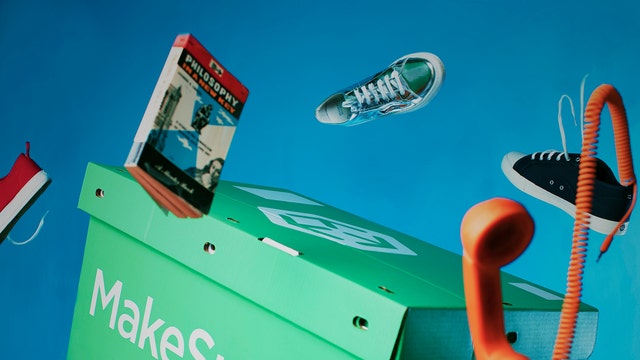Startups Giving Self-Storage a High-Tech Makeover
Ever wish you could just push a button, and your boxes would be delivered to a storage unit?
That’s the basic idea behind startups like MakeSpace and Boxbee, which are rethinking the self-storage experience. They’re providing a technology-enabled, door-to-door experience that saves customers from having to actually visit a storage unit.
Inspired by a bad experience trying to locate items in a recently packed storage unit, MakeSpace founder and CEO Sam Rosen said MakeSpace is similar in theory to other popular cloud-based startups.
“I thought to myself: If I can look through Spotify and find a song by album, or look through Dropbox and find a photo or a file, why can’t I do that same type of experience from my home, as opposed to going to a facility on a Saturday with my physical storage?,” said Rosen.
Here’s how MakeSpace works: Customers can schedule a pickup online or by phone. If you live in New York City, MakeSpace will drop off durable plastic bins. You can either pack up the bins within a 20-minute window, while a MakeSpace driver waits nearby, or you can schedule a later pickup. Then, the MakeSpace driver (called an “Uploader,” in the startup’s tech-y lingo) will deliver your boxes to a Jersey City warehouse for storage for $25 a month. This rate gets you four bins, which each measure 3 cubic feet.
“You can fit a lot [in each bin],” Rosen said. “Thirty to 40 sweaters, 15 to 20 pairs of shoes … I myself store all my hockey gear.” The company will also store some types of oversized items, like AC units and skis, but at this point in time will not pick up oversized furniture.
When customers want their bins back, they can go online, select the boxes they want returned, and schedule a delivery for a flat rate of $29.
‘We Are a Technology Company’
Though MakeSpace deals with physical storage, the company is, at its core, a technology startup, says Rosen.
MakeSpace has built software to optimize driver routes and make pickups more efficient. Customers are given a two-hour pick-up window, and Rosen said the technology has ensured on-time arrivals in over 99% of pickups.
The company has also built a driver-rating and bin-tracking system.
“We create digital signatures. Essentially … whoever is touching each physical bin, we have a record of that,” Rosen explained. Online, customers can see when boxes are in transit, and when they’ve arrived at the storage facility.
Aside from using technology to solve logistical problems, MakeSpace has created features that help solve a simple problem: Where did I put that?
“A significant majority of our customers – over 90% actually – opt in to allow us to open their box on a recorded studio camera at our warehouse, take a birds-eye picture and associate that with the bar code that’s on the box itself,” Rosen explained. “Coupled with the text description that they provided, either on our app or on a packing label that’s on the bin, we create a digital catalog. They can then log on to MakeSpace, go to their account and see all the stuff they’ve actually given us.”
The Big Business of Storage
While he wouldn’t share exact numbers, Rosen said MakeSpace has served thousands of customers since its launch in New York City last year. Last week, the company began offering a national service across the lower 48 states through a partnership with UPS.
Instead of receiving plastic bins from MakeSpace workers, customers outside New York City will receive durable cardboard boxes from UPS with shipping labels already printed. Once packed, customers ship the boxes to MakeSpace for free, and MakeSpace stores the boxes in its Jersey City warehouse.
The biggest difference is in the return process. Rather than charging a flat rate of $29 for all four boxes, MakeSpace charges $20 per box, for arrival within two to three days. However, Rosen said the company takes $1 off the return fee for each month the box is in storage; after a year, it would cost only $8 to get the box back.
Rosen said there are plans to build a West Coast warehouse, to allow for quicker delivery, with other warehouses to follow suit. The company will also launch its service with MakeSpace vans and drivers in two additional cities, to be announced in early 2015. MakeSpace has raised $10.1 million in venture capital from investors including Upfront Ventures, OATV and Lowercase Capital.
Self-storage was a $24 billion industry in the U.S. last year, according to the Self-Storage Association, with a 10’x10’ unit costing an average of $115 per month.
Aside from traditional self-storage companies, MakeSpace has a startup competitor in San Francisco-based Boxbee, which operates in both the Bay Area and New York City. Boxbee provides a door-to-door service similar to MakeSpace’s, but the pricing model is slightly different. While pickups are also free, storage costs $7.50 per box per month, while delivery costs $15, with an additional fee of $2 for each box.
Boxbee launched in early 2013 and has raised $2.5 million in venture capital, with plans to raise more by the end of the year. Boxbee founder Kristoph Matthews said the company is growing by 30% month-over-month, and will launch in three additional metro areas over the next six to 12 months.
Despite Boxbee’s growth, Rosen said traditional storage companies remain MakeSpace’s biggest competition.
“People need to be educated about how easy it is, and that the old experience doesn’t have to be the same any more, with MakeSpace. So we want to go up against that massive $24 billion business and say … We can actually provide a five-star level experience at a great price,” Rosen said.




















